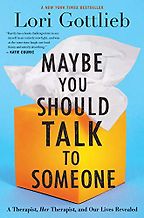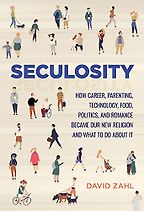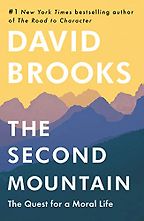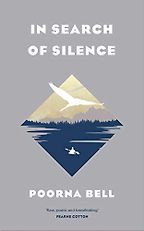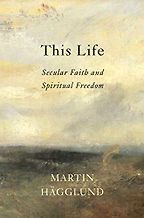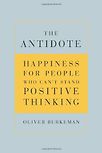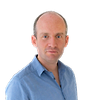We’re here to talk about the best self-help books of 2019. Before we start, let’s define our terms: what does ‘self-help’ mean to you?
I’m always a bit loath to think of self-help as just those books that get that label in the book store. In fact, I think sometimes that they’re among the less helpful books. The idea that philosophy and therapy are separate things would make very little sense to the ancient Greeks and Romans. The earliest philosophy was fully intended to make a difference, to change the way one lived. But then, the same is true of religious writing.
Conventional self-help works best when you know what your problem is, and there are some fairly good, respected, scientifically-backed ways of dealing with that problem. In that case, it’s good to have them packaged and promoted. But I’m increasingly interested in the kind of books that make you question whether you know what your problem is, as good therapy also should. A therapist should at least bear in mind the possibility that the thing you think is wrong with you is not what’s wrong with you at all – or that nothing might be wrong with you.
I go through phases of reading self-help. Often I find those books explicitly labelled as self-help tell me what I already know: common sense advice like: ‘You need a system… here’s an example.’ But I suppose I read them as motivation – to get in the right mindset to actually make the changes I already know I need to make.
That’s a good point. There’s a gap between knowing what you need to do and actually bringing yourself to do it, and if a given self-help book motivates you to do it, wonderful. Then again, there’s a problem with any book that purports to tell you, at long last, how to actually do something that you already knew was a good idea, which is that you need to actually implement that advice. At some point, you do just need to take action, on your own initiative.
I guess what I really want is for someone to tell me something I don’t know. Something that changes everything.
I think that’s partly why I’ve selected these books. They’re more about changing your perspective, rather than, ‘here are some actions that you might not previously have considered taking.’ But I’m conscious that this might not be a very typical view of what self-help is, and I don’t want to say that people aren’t greatly helped by the more straightforward, explicitly advice-based stuff.
Let’s talk about the first book on your list, which I think actually is marketed explicitly as self-help. This is Maybe You Should Talk to Someone by Lori Gottlieb. Perhaps you could tell us a little bit about why you think it’s one of the best self-help books of 2019.
This is a psychotherapist’s memoir, essentially. Gottlieb is also a journalist and a writer, but she’s a working psychotherapist, and this is the story of a crisis in her own life, intertwined with a whole cast of characters based on her patients. I really want to talk to her about how you do this, actually; I fully believe that she has protected everybody’s confidentiality, and yet these composite characters must be drawn very heavily from life, because they just ring so incredibly true.
It really reminds you – or me, anyway – that in many ways there’s no more exciting plot than the course of an ordinary life. That said, she’s a therapist in Los Angeles, so there’s a certain amount of Hollywood show business stuff which adds extra glitter. Some of the lives in question are unfolding on the sets of network television shows, and things like that.
I don’t want to spoil any of the specific plots, but there’s this idea that in therapy, and life in general, the ‘presenting problem’ is not necessarily the real problem. People seek Gottlieb out in a way that’s related to how we seek out self-help books – thinking we know what’s missing in our lives, and that you can hire someone to fix it, like you might hire a plumber or an accountant. But very often those assumptions are precisely what needs to be questioned.
Get the weekly Five Books newsletter
That has shown itself to be the case in my own life over and over again: you can be really, really efficient and brilliant at fixing certain problems, but actually, you’ve not understood the problem that you have. Often you’ve just gone and made it worse. To put it in the terms that Gottlieb might use, a lot of that kind of fixing is often really a form of avoidance.
An example that springs to mind is: you think you need to get tons more work done, so you go and buy self-help books about productivity techniques and becoming more efficient. Or you even seek out a therapist, and say: ‘Give me advice on cramming more into my day.’ But maybe your problem is actually workaholism. Maybe work is an attempt to avoid something else – to become so much the master of your work, say, that you don’t need to think about what’s happening to your life in terms of relationships. In that case, trying to become more efficient is a defence mechanism to help you avoid acknowledging the true situation.
What Gottlieb is so good at is that she’s not telling them that they’re full of shit, she takes their perspective on things very seriously – and yet creates this space in which they can also then let things come to the surface that they had been denying, or trying to keep down. Does that make sense?
Yes, it does. I do think the craze for being busy all the time contributes to poor mental health. People rush around without taking the time to look life full in the face. They burn out.
This is related to the book I’m trying to write at the moment, but it’s also related to my own life. I definitely know how easy it is to confuse frenetically doing with doing things that matter, and deriving a lot of self-worth from your ability to do things that aren’t necessarily worth doing, or are serving some kind of unhelpful hidden agenda.
The other thing I’d like to say about Gottlieb is that she really drills down into this idea that everybody’s behaviour has some kind of emotional rationale. It’s very dicey to talk in this way, because it can sound like justifying terrible behaviour, but it’s not; it’s about explaining it. She writes a brilliant advice column for The Atlantic, where people write in to report the ways in which their partners or family are behaving appallingly towards them. I think a lot of writers in that context would just ally themselves with the letter-writer in condemning the people they’re complaining about. And obviously there are contexts in which you should do that. But she also leads them toward seeing things from the other people’s perspective – not to excuse the bad behaviour, but because you can’t make any progress in life until you start to learn the emotional rationales according to which other people’s behaviour makes sense to them.
Perhaps what we were saying a moment ago about busyness could lead us to your second self-help book choice, which is Seculosity by David Zahl which you called “remarkable” in the Guardian. Could you tell us more?
It surprised me how much I got from this book, because it is – in a very low-key, not in your face way – a Christian work, and I’m not a Christian. David Zahl’s basic argument is that this idea that we’re not religious these days is mistaken; we’ve just transferred our religious urges onto things other than conventional organized religion. What he means by that is that we’re seeking salvation of some sort in work, in shopping, in the cultivation and creation of identities online, in parenting, in foodie culture and a whole bunch of other domains. We seek transcendent meaning from secular sources. ‘Seculosity’ is religiosity applied to the secular world.
I think he makes a really good argument from a Christian perspective: that religion has many, many flaws, but it has built into it a capacity for forgiveness that our other modern secular ‘religions’ don’t. This is the quality that he would call ‘grace’ – the idea that you are worthy, and acceptable, despite, perhaps almost because of, your flaws. That you don’t need to deserve God’s love, by meeting some kind of level of accomplishment or virtue, in order to have it. That’s very much not true when it comes to seeking salvation through, say, your work; there, you really do have to meet specific criteria to count as worthy, and you’ll probably find that the bar you’re supposed to meet keeps rising the closer you get to it.
“You might be seeking salvation from things that can’t really provide what you need”
I became a parent, what, three years ago now, and I’ve found that it’s very easy to think that you’re going to somehow one day find the perfect way of parenting, and, as a result, create the perfect adult, and as a result, finally get to consider yourself a worthy and successful parent. But it’s totally, totally counter-productive, a massively anxiety-inducing way of thinking. This book helps you see that that’s what you’re doing – that you’re trying to get something out of it, that it can’t provide. Though Zahl does, toward the end, make the case for his flavour of Christianity, I think it’s a really useful argument no matter your feelings about religion: that you might be trying to seek a kind of salvation from things that can’t really provide what you need.
Parenting is an interesting example, because parenting advice books are often explicitly described as parenting ‘philosophies.’ People are looking for guidance that goes beyond the practical.
I don’t mean to imply that by giving up the idea of achieving salvation through being a perfect parent, you are relegating parenting to something that isn’t really very important or satisfying. I think it’s abandoning that quest for salvation that enables you to really engage with it, and to connect to the meaning that it actually has to offer.
It’s not that there isn’t something transcendent about the relationship between a parent and child. It’s that there is something in that relationship that is spoiled when what you’re really trying to do is implement a philosophy.
By the way, I haven’t totally won the battle with implementing philosophies. I still fall for it all the time. But… baby steps.
I guess whenever we are struggling, we grasp at solutions. We convince ourselves it would be easy if only we could follow this philosophy perfectly. It has an internal logic, I think.
Yeah, and I think there’s also a sense of always wanting to be in control, of wanting to feel in a position of mastery. Of course, actual religion is very much about you not being in control. The good versions of religion don’t make your worth, as a human, dependent on having achieved mastery. You have to accept your relative place in the universe, but in return, you get the underserved gift of grace. I shouldn’t talk as if I understand the theology fully, because I don’t. But the core of the idea resonates deeply with me.
The other thing that’s worth saying is that there’s a chapter in this book on how religion can become a form of seculosity as well. There are plenty of versions of religion, especially here in the US, where it becomes its own form of secular salvation through believing that religion is the path to material riches, or to constant happiness in daily life, or something like that. It’s absolutely possible that you can engage in this mistaken quest for an unattainable form of salvation in a megachurch, as much as at the office or a shopping mall.
Maybe there are similar themes in the third 2019 self-help book we’re going to discuss. This is David Brooks’ The Second Mountain. Brooks, a New York Times columnist, talks about two figurative mountains in life, and I think the misdirected energy devoted to the ‘first mountain’ echoes some of what we’ve just been discussing.
Brooks gets a lot of grief from the Twitterati for his politics; he seems to drive some people completely up the wall. But what I’ve always liked about his writing, especially in book form, is that he doesn’t pretend to have everything together in his life. I’m always drawn to writers where you get a sense that they’re putting their insides out there, regardless of their politics. He sometimes gets teased online because you can detect, from the subjects that seize his interest, what particular issues he’s grappling with in his own life at that moment – divorce, ageing, et cetera – and for some reason his critics see this as terribly embarrassing. But I’m always like: great, finally, a pundit who’s not just pretending to have everything solved!
The basic idea of the ‘second mountain’ metaphor is that there are two phases in most people’s lives, or that ideally there ought to be. First, there’s a young adulthood phase that very properly is about making your place in the world and developing your talents, starting a family, buying a house, making a career and a name for yourself. It’s largely self-focused, but not in a bad way; that’s the appropriate focus of that phase. But there often does come a point when the strategy seems to stop working, seems to stop bringing the fulfilment it once did.
Five Books interviews are expensive to produce. If you're enjoying this interview, please support us by donating a small amount.
The so-called ‘second mountain’ is a shift toward asking what life is demanding of you, rather than what you can get out of it. Brooks thinks we’re in a culture that’s so hyper-individualistic that we often miss moving to this second mountain. But if you get to a point in your life or your career where everything seems a bit empty and meaningless, even though you might outwardly be very successful, it might be time to switch mountains.
A lot of the book consists of the inspiring stories of people in history, and in the present day, who’ve found and enacted this second purpose of their lives in an astonishingly impressive way that most of us never will. But, as inspiration, they’re really powerful stories. At the same time, he’s writing about his own crises, which, as I say, I always find very disarming. Even when part of his crisis is that he left his wife who he’d been married to for more than two decades, and later married a woman 23 years younger than him, who’d previously worked as his researcher.
That particular crisis doesn’t rouse my sympathies, I have to say.
It’s not a story that you’re likely to come out well from telling! Most of us, I think, would approach the basic facts of that story thinking judgmental thoughts about the person telling it, and not necessarily unwarrantedly. All I’m saying is that I think it is a very honest and authentic book. I don’t think he’d ask you to endorse his life choices, necessarily. I admire him being willing to go ahead and write the book the way he did, because he must know what people are going to say when you tell that particular story.
Well, this leads into another point I was going to make. I wonder if there is something very masculine about this idea of the first phase of life being about self-centred behaviour. I think a lot of women (and, I’m sure, men too) feel completely absorbed by the lives and needs of others. Nigella Lawson wrote very perceptively on the subject recently in The Sunday Times: for some, she said, “it is more complicated than simply prioritising one’s wants: it can be hard even to distinguish what they might be.” Such people are probably not looking for advice on how to look beyond themselves for fulfilment.
That’s a really interesting point. The mountain metaphor too is probably a little macho to begin with. Ultimately I think this may be best thought of in Jungian terms, though Brooks doesn’t do it that way – and from this perspective, the second phase of life can absolutely be seen as a matter of coming home to yourself, claiming your own authority, even listening to your own soul, if you like that sort of language. So it’s not that the first mountain is selfish and the second mountain selfless, but that the first mountain is about following what modern society tells you you ought to do, to have a happy life, while the second mountain is about going beyond that to something that doesn’t see ‘a happy life’ as the priority anyway.
Great. Let’s talk about book number four, another book that draws heavily from the author’s life. This is Poorna Bell’s In Search of Silence, a book written after she was widowed in 2015. Perhaps you could tell us a little bit about it.
This is actually the second book that she has written after losing her husband to suicide, so this is a kind of a sequel to Chase the Rainbow. It’s essentially a travelogue, intertwining an outer journey with an inner one. People have made comparisons to Eat, Pray, Love – a book I really liked, actually. Bell leaves her job and travelled to various places that have significance for her, including India, where her family heritage is, and New Zealand, where her husband’s family was from.
I don’t mean to sound dismissive about individual locations, but what made an impression for me from this book was the role and importance of the perspective she gained. It isn’t about her going to find the answer in some physical location, at the top of the mountain, or by meeting a specific person, or anything like that; instead the book is at least partly about the power of travel to bring you back to yourself, and to let you see your life in a radically different way. There’s a weird power in this: even if you acquire no new information about what’s gone wrong, or the direction you should take in life, simply changing the place from which you’re seeing it all can make a big difference. Bell addresses the way we chronically hope that other people, or certain lifestyle choices, are going to ‘fix’ us, and how unhelpful that is; the end result of her all her physical travel is to come back to herself.
That sounds very moving. Let’s move onto the final recommendation from your list of 2019 self-help books. This one being less explicitly ‘self-help’ in tone. This Life by Martin Hägglund.
This is a massive book by a Yale University philosopher, but it’s surprisingly readable. In contrast to the David Zahl book, it makes the case for what Hägglund calls ‘secular faith.’ He argues that it is the finitude of life – the fact that we’re only here briefly and all our relationships are therefore only here briefly – is precisely what gives them their value. One main way of interpreting the religious idea of eternal life is that what really matters in life is what’s eternal, what can’t ever perish. Hägglund wants to say, not only is that not the case, but if it was, life would become meaningless because you could never really meaningfully face the question of how to use your precious, finite time. Because it wouldn’t be precious.
He pitches this mainly as a response to religion, but I don’t think religious people are the only ones to find themselves in this mindset of valuing the eternal over the transient. One other way in which it manifests itself is in all this stuff coming out of Silicon Valley about living forever – people who think they’re about to crack the secret of living for thousands of years, and apparently believing that this will be highly desirable.
The life extension movement. I’m frightened of the idea. It makes me think of Tithonus: granted eternal life, but begging to die.
And yet I think most of us who aren’t religious, unless you’ve really been through a lot of up-close confrontation with death, which I have not, do still think of ourselves, in the back of our minds, in some unarticulated way, as being immortal. You would never admit to it, if asked – but even so I’m not sure that most of us really live our lives as if our time were brief and finite.
Yes.
So the case Hägglund makes is powerful even if you don’t explicitly believe in the afterlife. It’s a wake-up call: not only have you only got so much time, but you should fully face up to that fact, rather than avoiding it, because ultimately you wouldn’t want it to be otherwise. Then, the second half of this book goes off into politics. Hägglund seeks to show why it follows from all this that democratic socialism is the best way to organize society. Which is very interesting, but probably more outside the scope of what we’re talking about here.
Hägglund talks about the question of faith in this book, religious faith versus a secular kind of faith. I find it interesting that a number of the books that we’ve discussed today are focused on this idea of finding meaning in a secular world. Is that the role that self-help needs to play now?
I think it would be a very good one. The simplest way of thinking about it is, I suppose, is just that it’s helpful to think about living a meaningful life rather than a happy one; and I do think there has been a cultural shift from a focus on happiness to a focus on meaning. It can be difficult to define what a ‘meaningful life’ is, except to say that you know it when you encounter it, and that it does seem more worth seeking than any specific emotion, even the very positive ones.
There’s a writer called James Hollis, whose work I really like, who says that sometimes the right question to ask yourself – about a major life-choice for example – is not: ‘Will this choice make me happy or sad?’ but: ‘Will it enlarge me or diminish me?’ I’ve often found that when you phrase the question this way, you do know the answer. You can’t actually know whether choices relating to relationships or careers are ultimately going to ‘cash out’ in success or happiness. But I think we do have a good instinct as to whether a given option is the growth-oriented choice or not.
“The right question to ask yourself is not: ‘Will this choice make me happy or sad?’ but: ‘Will it enlarge me or diminish me?’”
To go back to Lori Gottlieb, that’s another thing she seems very good at: helping her clients and the reader navigate that question. You realize that at certain junctions in life, the thing that would actually make you happiest is the opposite of the thing that would lead to some kind of growth.
Sorry, I’ve drifted away from the question. But I think it’s a theme that does come out in all the books I’ve mentioned. Is that because there’s been a change in the world, or is it just that I’m changing as I move through my forties? You can never tell.
I think self-help is like poetry in that way. It has to chime with you personally. But recommendations are still helpful, because it helps you to decide whether it might resonate with you or not. You have written a great deal about self-help philosophies throughout your career. Do you live a better life because of it? Is there value in self-help?
Yes, absolutely. I mean, I started off being someone who was getting comedy value out of mocking self-help, and I’m still happy to do that from time to time. But I think that for people of a certain demographic – that I suspect you and I and many of the readers of Five Books fit into, broadly speaking – sometimes the real challenge is not to remember to be sceptical, to remember to reject all the bullshit, but on the contrary, to allow the possibility that a book with a slightly embarrassing title, or that seems too earnest, or that you wouldn’t necessarily want people to see you reading on the Tube, might nonetheless contain some real value. To push the point further: maybe your embarrassment about it itself is an indication that a given book or way of seeing things has value – that a sensitive spot is being touched, because it needs to be.
Interview by Cal Flyn, Deputy Editor
November 22, 2019. Updated: January 4, 2022
Five Books aims to keep its book recommendations and interviews up to date. If you are the interviewee and would like to update your choice of books (or even just what you say about them) please email us at [email protected]
